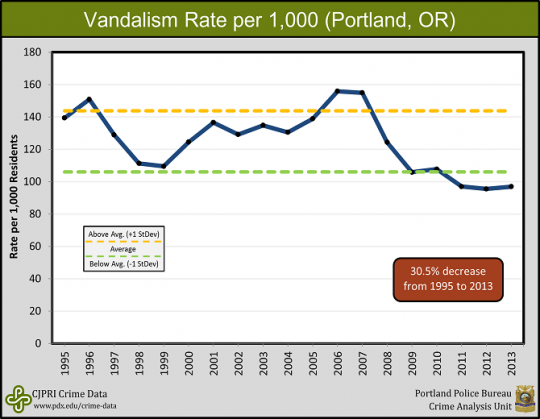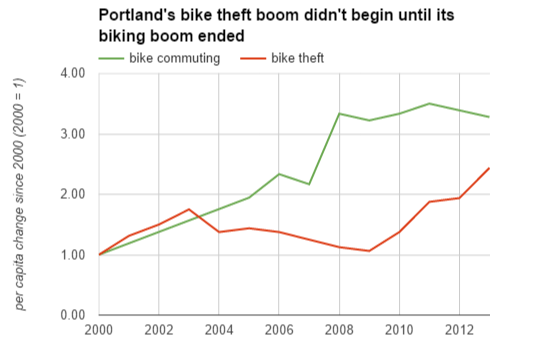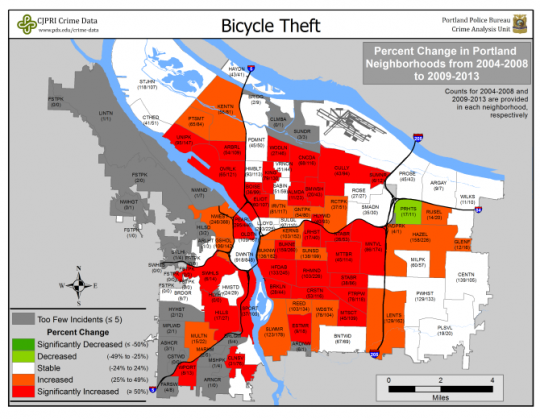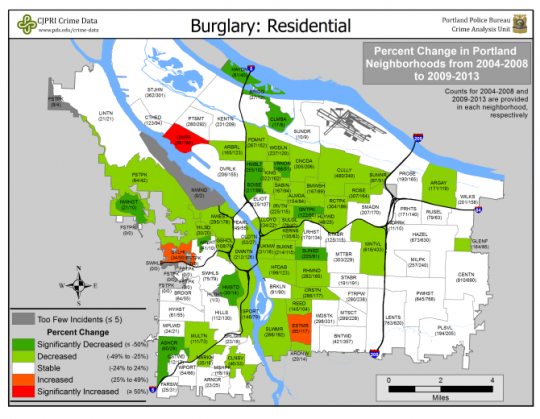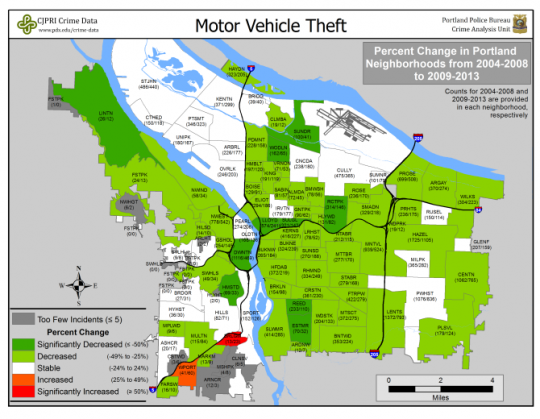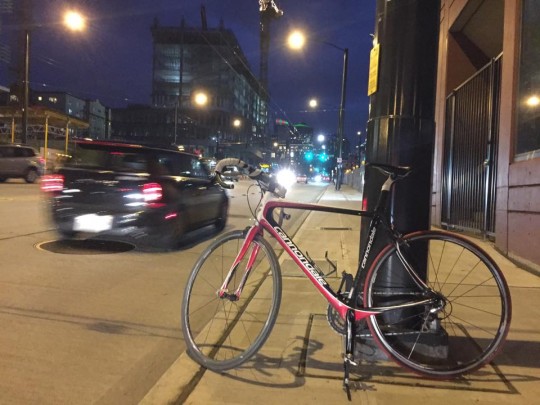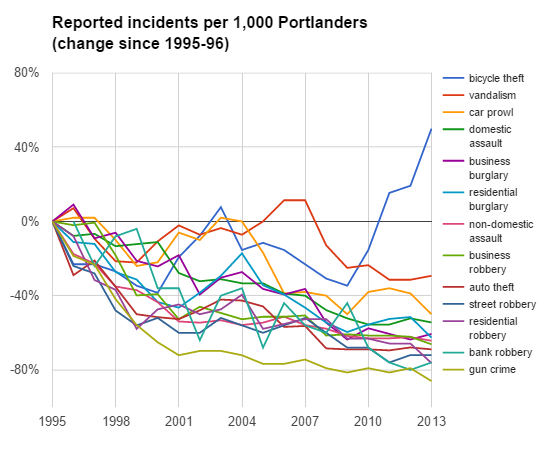
Like most cities in the developed world, Portland is a dramatically more secure place than it was in 1995.
Reported residential burglaries per resident are down 63 percent. Auto theft is down 69 pecent. Gun crime is down 86 percent.
But 20 years of Portland crime statistics collected Wednesday on Portland State University’s website showed that there’s a single glaring exception: bike theft. It’s up 50 percent since 1995.
Maybe more alarmingly, bike theft was falling too until it soared 130 percent starting in 2009 — which was also the year Portland’s celebrated spike in bike commuting leveled off. This suggests that the spike in bike theft is related to something other than just the number of bicycles around.
The cost of bike thefts, of course, fall mostly on the subset of Portlanders who own and regularly use bikes, maybe 20 to 30 percent of the city’s population.
According to the data from PSU’s Criminal Justice Police Research Institute, 2,307 bikes were reported stolen from Portlanders in 2013, the most recent year tallied here.
That’s 40 bikes per 1,000 Portlanders, or a little less than half the residential burglary rate in 1995 — a time when urban crime was one of the hottest issues in the country and President Clinton’s crime bill dominated the national conversation.
The cost of bike thefts, of course, fall mostly on the subset of Portlanders who own and regularly use bikes, maybe 20 to 30 percent of the city’s population.
Bike theft victims in 2013 included Portland Bureau of Transportation Director Leah Treat. Last year, City Commissioner Nick Fish “joined the club,” as he put it in a Facebook post.
The PSU visualizations show that the spike in bike thefts has been almost universal across the city. Here’s a map of where bike theft has gotten worse, with the biggest increases over the last 10 years marked in the deepest red:
For comparison’s sake, here’s a look at residential burglary trends over the same period:
And car thefts:
PSU has even made a series of animated GIFs that show the worst locations for each of these crimes over time. Here’s the one for bike theft, which shows how it was mostly a central-city phenomenon until 2008, and burst citywide in 2012 and 2013.
The huge spike in reported bike theft isn’t a surprise in itself, at least to regular BikePortland readers. We reported last December that incidents were up sharply in 2013 and 2014, according to a bike theft trend report from the Portland Police Bureau. (For some reason, the numbers it uses are a little different than the ones used by PSU, but the trend is similar.)
What the PSU numbers show, however, is how dramatically bike theft has increased while every other category of crime fell by 30 percent or more.
Advertisement
Here at BikePortland, we’ve been responding to this problem directly by partnering with the Bike Index anti-theft service to host a Portland Bike Theft Summit, which brought in more terrific partners and has led to the PPB creating a Bike Theft Task Force.
In our Bike Theft Chronicles series, we’ve shared stories like the time a thief snapped a sign off a 10-foot-tall pole to thread the bike over the top (six months ago) or the week someone went around town sawing through bike staples (four months ago).
A #bikethief in #pdx sawed through staple rack on Morrison/SE 7th & stole a Trek Lexa S https://t.co/6DMLhnzXeA pic.twitter.com/XdhhH4VN0g
— BikeIndex Portland (@stolenbikereg) January 5, 2015
We’ve reported on Lake Oswego police detectives tracing stolen bikes to a major bike-fencing operation operating semi-openly out of two downtown buildings.
Another story came across my screen yesterday.
Cameron Whitten, a well-known social justice advocate in Portland, had parked his bike outside the First Unitarian Church in downtown’s west end on Tuesday night, from about 7 to 9 p.m. Some time in that period, someone apparently managed to detach a blue bike staple from the sidewalk and make off with this bicycle:
I called the church Wednesday morning to get their take.
“They unbolted it from the ground, picked it up, left the rack and then they just took the bike,” said Jason Chapman, the church facilities manager. “It’s kind of like recessed a little bit, you’re further back from the street. But if you’re in a car and you looked over, you’d see it.”
“We’ll reinstall the thing and I’m thinking I might weld the bolts to the rack so they can’t be unscrewed,” Chapman added. “I’m not sure what else I can do. I can probably put a camera out there. Maybe I will do that.”
Whitten, for his part, was sad.
“He was a good bike,” he wrote on Facebook. “Won’t have the funds to replace him for a while.”
I hope and expect Whitten (a friend) will eventually be able to find his way back onto a bike even if his isn’t recovered. But that won’t change the awfulness of this theft or the thousands like it. And it doesn’t change maybe the most depressing fact in all of bike theft: 7 percent of victims never replace their bikes.
